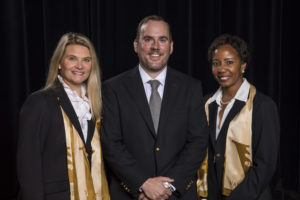By Web Communications
This post was written by Katie Bahr.
The capstone project is a hallmark of Vanderbilt’s Master of Management in Health Care program. From January through the end of the program in the fall, students work in teams of 4-5 people on projects for healthcare organizations, from ideation to implementation. The capstone gives students the opportunity to apply their classroom knowledge to the real world, while healthcare organizations benefit from student’s perspectives and consulting recommendations.
Dr. Johnetta Blakely, Dr. Natalie Dickson, and Dr. Jay Erter — all MMHC’18 graduates — decided to apply their classroom learning to their employer Tennessee Oncology, which has more than 30 locations across the state. The physicians chose to focus the capstone on remote patient visits, which Tennessee Oncology began planning to implement back in spring 2017.
“The three of us went into the MMHC (program) knowing that we wanted our capstone to focus on remote patient visits,” Erter says. “Rather than hiring a consulting company to work through the problem, we decided to spend that cost on ourselves, get a degree, and build the infrastructure on our own.”
The Origins

The TN Oncology team, from left to right: Dr. Johnetta Blakely, Dr. Jay Erter, and Dr. Natalie Dickson
The major hurdles to remote patient visits are more institutional than technological. Legal aspects involving medical privacy and insurance policies that govern where patients and physicians can meet limited the scope of the project.
“It was a lot more far-reaching than just putting a computer together,” Erter says. “There are a lot of barriers about how physicians can use their time and bill for it. We tried to avoid project creep and just tackle one problem in our practice for now.”
Initially, the students decided to concentrate on clinical trial patients, since Tennessee Oncology has a robust research program encompassing more than 1,000 patients in clinical trials per year. Without research nurses at all of their locations, it can be difficult to get patients through the consent procedures and on-boarded into the clinical trials.
“A research nurse can remotely consent and consult with those patients,” Erter says. “Billing and insurance aren’t as much of an issue in these cases, and this particular focus could help us build an infrastructure that we know works once the industry’s policies progress.”
The Project
Erter, Dickson, and Blakely were far from alone in making remote patient visits a reality in their practice, but they used their capstone to organize and lead large teams within Tennessee Oncology.
“All of us have gotten very used to being siloed off in our medical practice,” says Erter. “The capstone made us work to put teams together, organize them, lead them, and delegate responsibilities.”
Within Tennessee Oncology, more than 25 employees contributed to the project including IT, research, and finance professionals. The entire group met once a week with Erter, Dickson, and Blakely, who ensured that the right responsibilities were matched with the right skill sets and everyone was moving in the same direction.
They began the capstone in early 2018, and by June they had a functioning prototype of the remote visit software and process. Tennessee Oncology began using it right away. “By the time we launched the prototype we had actually worked out most of the kinks,” Erter says. “Certainly, we made minor changes to the technology, and we’ll keep tweaking it, but for the most part it was ready to go.”
The remote consent process for clinical patients has become a key tool for Tennessee Oncology, but this capstone was always rooted in a larger concern for rural patient care. Erter says he and his colleagues envision a day when home health care workers can draw blood or other samples and patients could discuss their results with physicians via their smart phone or computer.
“We’ve built an infrastructure that we know works for that,” Erter says. “The current legislative and insurance policies don’t allow for it, but the landscape is changing rapidly.”
By setting three of its own physicians to the task, Tennessee Oncology gained insight and experience into a healthcare tool that’s currently out of reach for most medical practices, but will play a large role in healthcare of the future. The organization’s investment will put it on the cutting edge of being able to deliver the kind of care its physicians envision for rural patients once the landscape does change.
To learn more about the Master of Management in Health Care at Vanderbilt Business, visit the program page or request information.